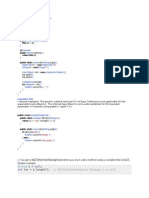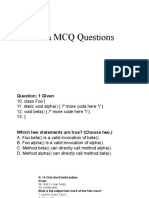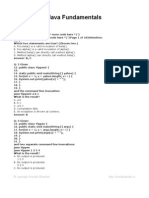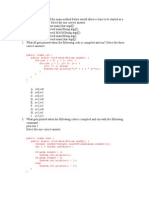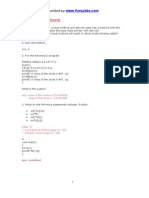Ocjp 6
Ocjp 6
Uploaded by
Umakant BhardwajCopyright:
Available Formats
Ocjp 6
Ocjp 6
Uploaded by
Umakant BhardwajOriginal Description:
Copyright
Available Formats
Share this document
Did you find this document useful?
Is this content inappropriate?
Copyright:
Available Formats
Ocjp 6
Ocjp 6
Uploaded by
Umakant BhardwajCopyright:
Available Formats
1.Which Man class properly represents the relationship "Man has a best friend wh o is a Dog"? A.
class Man extends Dog { } B. class Man implements Dog { } C. class Man { private BestFriend dog; } D. class Man { private Dog bestFriend; } E. class Man { private Dog<bestFriend>; } F. class Man { private BestFriend<dog>; } 2.Given: try { //some code here line 34 } catch (NullPointerException e1) { System.out.print("a"); } catch (Exception e2) { System.out.print("b"); } finally { System.out.print("c"); } If some sort of exception is thrown at line 34, which output is possible? A. a B. b C. c D. ac E. abc 3.abstract class A { abstract void a1(); void a2() { } } class B extends A { void a1() { } void a2() { } } class C extends B { void c1() { } } And: A x = new B(); C y = new C(); A z = new C(); What are four valid examples of polymorphic method calls? (Choose four.) A. x.a2(); B. z.a2(); C. z.c1(); D. z.a1(); E. y.c1(); F. x.a1(); 4.Given: 3. class Employee { 4. String name; double baseSalary; 5. Employee(String name, double baseSalary) { 6. this.name = name; 7. this.baseSalary = baseSalary; 8. }
9. } 10. public class SalesPerson extends Employee { 11. double commission; 12. public SalesPerson(String name, double baseSalary, double commission) { 13. // insert code here 14. } 15. } Which two code fragments, inserted independently at line 13, will compile? (Choo se two.) A. super(name, baseSalary); B. this.commission = commission; C. super(); this.commission = commission; D. this.commission = commission; super(); E. super(name, baseSalary); this.commission = commission; F. this.commission = commission; super(name, baseSalary); G. super(name, baseSalary, commission); 5.iven: 11. // insert code here 12. private N min, max; 13. public N getMin() { return min; } 14. public N getMax() { return max; } 15. public void add(N added) { 16. if (min == null || added.doubleValue() < min.doubleValue()) 17. min = added; 18. if (max == null || added.doubleValue() > max.doubleValue()) 19. max = added; 20. } 21. } Which two, inserted at line 11, will allow the code to compile? (Choose two.) A. public class MinMax<?> { B. public class MinMax<? extends Number> { C. public class MinMax<N extends Object> { D. public class MinMax<N extends Number> { E. public class MinMax<? extends Object> { F. public class MinMax<N extends Integer> { 6.A programmer has an algorithm that requires a java.util.List that provides an efficient implementation of add(0, object), but does NOT need to support quick random access . What supports these requirements? A. java.util.Queue B. java.util.ArrayList C. java.util.LinearList D. java.util.LinkedList Given: 11. public class Person { 12. private name; 13. public Person(String name) { 14. this.name = name; 15. } 16. public int hashCode() { 17. return 420; 18. } 19. }
Which statement is true? A. The time to find the value from HashMap with a Person key depends on the size of the map. B. Deleting a Person key from a HashMap will delete all map entries for all keys of type Person. C. Inserting a second Person object into a HashSet will cause the first Person object to be removed as a duplicate. D. The time to determine whether a Person object is contained in a HashSet is constant and does NOT depend on the size of the map. 8.Given: 1. class Alligator { 2. public static void main(String[] args) { 3. int []x[] = {{1,2}, {3,4,5}, {6,7,8,9}}; 4. int [][]y = x; 5. System.out.println(y[2][1]); 6. } 7. } What is the result? A. 2 B. 3 C. 4 D. 6 E. 7 F. Compilation fails. 9.1. package packageA; 2. public class Message { 3. String getText() { return "text"; } 4. } and: 1. package packageB; 2. public class XMLMessage extends packageA.Message { 3. String getText() { return "<msg>text</msg>";} 4. public static void main(String[] args) { 5. System.out.println(new XMLMessage().getText()); 6. } 7. } What is the result of executing XMLMessage.main? A. text B. An exception is thrown at runtime. C. Compilation fails because of an error in line 2 of XMLMessage. D. Compilation fails because of an error in line 3 of XMLMessage. 10.1. class Programmer { 2. Programmer debug() { return this; } 3. } 4. class SCJP extends Programmer { 5. // insert code here 6. } Which, inserted at line 5, will compile? (Choose all that apply.) A. Programmer debug() { return this; } B. SCJP debug() { return this; } C. Object debug() { return this; } D. int debug() { return 1; } E. int debug(int x) { return 1; } F. Object debug(int x) { return this; }
11.package packageA; 2. public class Message { 3. String getText() { return "text"; } 4. } and: 1. package packageB; 2. public class XMLMessage extends packageA.Message { 3. String getText() { return "<msg>text</msg>";} 4. public static void main(String[] args) { 5. System.out.println(new XMLMessage().getText()); 6. } 7. } What is the result of executing XMLMessage.main? A. text B. An exception is thrown at runtime. C. Compilation fails because of an error in line 2 of XMLMessage. D. Compilation fails because of an error in line 3 of XMLMessage. 12.Given: class Foo { public int a = 3; public void addFive() { a += 5; System.out.print("f "); } } class Bar extends Foo { public int a = 8; public void addFive() { this.a += 5; System.out.print("b " ); } } Invoked with: Foo f = new Bar(); f.addFive(); System.out.println(f.a); What is the result? A. b 3 B. b 8 C. b 13 D. f 3 E. f 8 F. f 13 G. Compilation fails. H. An exception is thrown at runtime. 1.Given: 1. class PingPong2 { 2. synchronized void hit(long n) { 3. for(int i = 1; i < 3; i++) 4. System.out.print(n + "-" + i + " "); 5. } 6. } 1. public class Tester implements Runnable { 2. static PingPong2 pp2 = new PingPong2(); 3. public static void main(String[] args) { 4. new Thread(new Tester()).start(); 5. new Thread(new Tester()).start(); 6. } 7. public void run() { pp2.hit(Thread.currentThread().getId()); } 8. } Which statement is true? A. The output could be 5-1 6-1 6-2 5-2 B. The output could be 6-1 6-2 5-1 5-2
C. The output could be 6-1 5-2 6-2 5-1 D. The output could be 6-1 6-2 5-1 7-1 1.Given: 11. // insert code here 12. private N min, max; 13. public N getMin() { return min; } 14. public N getMax() { return max; } 15. public void add(N added) { 16. if (min == null || added.doubleValue() < min.doubleValue()) 17. min = added; 18. if (max == null || added.doubleValue() > max.doubleValue()) 19. max = added; 20. } 21. } Which two, inserted at line 11, will allow the code to compile? (Choose two.) A. public class MinMax<?> { B. public class MinMax<? extends Number> { C. public class MinMax<N extends Object> { D. public class MinMax<N extends Number> { E. public class MinMax<? extends Object> { F. public class MinMax<N extends Integer> { 1.Given: 22. StringBuilder sb1 = new StringBuilder("123"); 23. String s1 = "123"; 24. // insert code here 25. System.out.println(sb1 + " " + s1); Which code fragment, inserted at line 24, outputs "123abc 123abc"? A. sb1.append("abc"); s1.append("abc"); B. sb1.append("abc"); s1.concat("abc"); C. sb1.concat("abc"); s1.append("abc"); D. sb1.concat("abc"); s1.concat("abc"); E. sb1.append("abc"); s1 = s1.concat("abc"); F. sb1.concat("abc"); s1 = s1.concat("abc"); G. sb1.append("abc"); s1 = s1 + s1.concat("abc"); H. sb1.concat("abc"); s1 = s1 + s1.concat("abc"); 1.Think and comment ... import java.io.*; class Directories { static String [] dirs = {"dir1", "dir2"}; public static void main(String [] args) { for (String d : dirs) { // insert code 1 here File file = new File(path, args[0]); // insert code 2 here } } } and that the invocation java Directories file2.txt is issued from a directory that has two subdirectories, "dir1" and "dir1", and that "dir1" has a file "file1.txt" and "dir2" has a file "file2.txt",and the output is "false true", which set(s) of code fragments must be inserted? (Choose all that apply.) A. String path = d; System.out.print(file.exists() + " ");
B. String path = d; System.out.print(file.isFile() + " "); C. String path = File.separator + d; System.out.print(file.exists() + " "); D. String path = File.separator + d; System.out.print(file.isFile() + " "); 1.Que: 28 1. public class Plant { 2. private String name; 3. public Plant(String name) { this.name = name; } 4. public String getName() { return name; } 5. } 1. public class Tree extends Plant { 2. public void growFruit() { } 3. public void dropLeaves() { } 4. } Which statement is true? A. The code will compile without changes. B. The code will compile if public Tree() { Plant(); } is added to the Tree clas s. C. The code will compile if public Plant() { Tree(); } is added to the Plant cla ss. D. The code will compile if public Plant() { this("fern"); } is added to the Pla nt class. E. The code will compile if public Plant() { Plant("fern"); } is added to the Pl ant class. 1.Que: 27 Given: 3. import java.util.*; 4. public class Hancock { 5. // insert code here 6. list.add("foo"); 7. } 8. } Which two code fragments, inserted independently at line 5, will compile without warnings? (Choose two.) A. public void addStrings(List list) { B. public void addStrings(List<String> list) { C. public void addStrings(List<? super String> list) { D. public void addStrings(List<? extends String> list) { previous Que: 26 answer are "DE" 1.*OCJP 6 Question on 25 March 2013 Exam* Que: 26 Given: 11. public class Commander { 12. public static void main(String[] args) { 13. String myProp = /* insert code here */ 14. System.out.println(myProp); 15. } 16. } and the command line: java -Dprop.custom=gobstopper Commander Which two, placed
on line 13, will produce the output gobstopper? (Choose two.) A. System.load("prop.custom"); B. System.getenv("prop.custom"); C. System.property("prop.custom"); D. System.getProperty("prop.custom"); E. System.getProperties().getProperty("prop.custom"); previous Que: 25 answer are "BC" 1.Given: **Think and comment** its a previous OCJP6 exam question ... Que: 24 1. public class Threads3 implements Runnable { 2. public void run() { 3. System.out.print("running"); 4. } 5. public static void main(String[] args) { 6. Thread t = new Thread(new Threads3()); 7. t.run(); 8. t.run(); 9. t.start(); 10. } 11. } What is the result? A. Compilation fails. B. An exception is thrown at runtime. C. The code executes and prints "running". D. The code executes and prints "runningrunning". E. The code executes and prints "runningrunningrunning". previous Que: 23 answer are "ABD" 1.Que: 25 Given: 1. package com.company.application; 2. 3. public class MainClass { 4. public static void main(String[] args) {} 5. } And MainClass exists in the /apps/com/company/application directory. Assume the CLASSPATH environment variable is set to "." (current directory). Which two java commands entered at the command line will run MainClass? (Choose two.) A. java MainClass if run from the /apps directory B. java com.company.application.MainClass if run from the /apps directory C. java -classpath /apps com.company.application.MainClass if run from any direc tory D. java -classpath . MainClass if run from the /apps/com/company/application dir ectory E. java -classpath /apps/com/company/application:. MainClass if run from the /ap ps directory F. java com.company.application.MainClass if run from the /apps/com/company/appl ication directory
previous Que: 24 answer is "E" 1.*OCJP 6 Question on 19-March-13* Que: 23 11. public interface Status { 12. /* insert code here */ int MY_VALUE = 10; 13. } Which three are valid on line 12? (Choose three.) A. final B. static C. native D. public E. private F. abstract G. protected previous Que: 22 answer is "A" 1. **Think and comment** its a previous OCJP6 exam question ... Que: 22 10. interface Data { public void load(); } 11. abstract class Info { public abstract void load(); } Which class correctly uses the Data interface and Info class? A. public class Employee extends Info implements Data { public void load() { /*do something*/ } } B. public class Employee implements Info extends Data { public void load() { /*do something*/ } } C. public class Employee extends Info implements Data { public void load(){ /*do something*/ } public void Info.load(){ /*do something*/ } } D. public class Employee implements Info extends Data { public void Data.load(){ /*do something*/ } public void load(){ /*do something*/ } } E. public class Employee implements Info extends Data { public void load(){ /*do something*/ } public void Info.load(){ /*do something*/ } } F. public class Employee extends Info implements Data{ public void Data.load() { /*do something*/ } public void Info.load() { /*do something*/ } } previous Que: 21 answer is "A"
You might also like
- All Milestone MCQ PDFDocument75 pagesAll Milestone MCQ PDFSabari SabsterNo ratings yet
- AP Computer Science A Practice Test 2018Document22 pagesAP Computer Science A Practice Test 2018Kelvin W100% (1)
- Introduction To Graphql: Niv Ben DavidDocument50 pagesIntroduction To Graphql: Niv Ben DavidLatha SriNo ratings yet
- Soal PboDocument11 pagesSoal Pboraissa aminiNo ratings yet
- Sun Certified Programmer For The Java Platform Assessment Test Exam 310-065 SCJP 1.6 - 2013Document14 pagesSun Certified Programmer For The Java Platform Assessment Test Exam 310-065 SCJP 1.6 - 2013vimale8No ratings yet
- Java Essential Practice Set 2Document21 pagesJava Essential Practice Set 2Nipoorva YadavNo ratings yet
- Examen Java Programmer IDocument116 pagesExamen Java Programmer IRicardo Bautista Silva0% (1)
- Examen Java Programmer I OCA JPDocument116 pagesExamen Java Programmer I OCA JPEdgarHofstadterNo ratings yet
- Preguntas TipoDocument40 pagesPreguntas TipoBREINER ROISER CORREA ATUCSANo ratings yet
- Java Questions 1: A. B. C. DDocument11 pagesJava Questions 1: A. B. C. Dzynofus technologyNo ratings yet
- Collections Linkedlist List Hashtest String Hashtest String: Import Java Import Java Import Java Public ClassDocument27 pagesCollections Linkedlist List Hashtest String Hashtest String: Import Java Import Java Import Java Public Classkhardemegha0% (1)
- All Questions 1-50Document25 pagesAll Questions 1-50hamid_25No ratings yet
- Java Language Fundamentals.Document11 pagesJava Language Fundamentals.Sirisha KurakulaNo ratings yet
- 3301 Question BankDocument91 pages3301 Question BankSHAIKH MD ZAID PYARELAL 17BME0809No ratings yet
- Practice Core Java and Advanced Java MCQsDocument13 pagesPractice Core Java and Advanced Java MCQsKaushik RaoNo ratings yet
- Java MCQ QuestionsDocument29 pagesJava MCQ QuestionsJeyanesh VasuNo ratings yet
- P - Latihan Soal OOPDocument16 pagesP - Latihan Soal OOPMemeyNo ratings yet
- Sample QuestionsDocument31 pagesSample QuestionsMaria IgescuNo ratings yet
- 1 - LanguagefundamentalsDocument13 pages1 - LanguagefundamentalsJack BrownNo ratings yet
- SCJP 6.0認證教戰手冊考題201-244Document25 pagesSCJP 6.0認證教戰手冊考題201-244Lawrence TsaoNo ratings yet
- Java Objective QuestionsDocument12 pagesJava Objective QuestionsNipun BakshiNo ratings yet
- Java CTS Dumps 2Document28 pagesJava CTS Dumps 2TRICKY MINDNo ratings yet
- Java ExerciseDocument7 pagesJava ExerciseShweta VermaNo ratings yet
- Assessment 1Document28 pagesAssessment 1Satish PatilNo ratings yet
- Examen Java Programmer IDocument118 pagesExamen Java Programmer IRicardo Bautista SilvaNo ratings yet
- Java Placement QuestionsDocument23 pagesJava Placement QuestionsVidhya PrakashNo ratings yet
- AdharDocument5 pagesAdhareyufgNo ratings yet
- Exam809 SampleQuestion PDFDocument5 pagesExam809 SampleQuestion PDFEric NuñezNo ratings yet
- Java TestDocument20 pagesJava Testtunglt102No ratings yet
- CS 180 Fall 2006 Final Exam: Recitation Start TimeDocument27 pagesCS 180 Fall 2006 Final Exam: Recitation Start TimeIshan JawaNo ratings yet
- Core Java Theory TestDocument10 pagesCore Java Theory TestNeha VermaNo ratings yet
- CML ContestDocument16 pagesCML ContestbellatacoNo ratings yet
- Exam808 SampleQuestionDocument4 pagesExam808 SampleQuestionAnonymous AFFiZnNo ratings yet
- 1z0-809.exam.53q: Number: 1z0-809 Passing Score: 800 Time Limit: 120 MinDocument44 pages1z0-809.exam.53q: Number: 1z0-809 Passing Score: 800 Time Limit: 120 Mingeba dapNo ratings yet
- Oracle Prepaway 1z0-809 v2020-01-29 by Bat 109qDocument90 pagesOracle Prepaway 1z0-809 v2020-01-29 by Bat 109qANISH SHARMANo ratings yet
- Java FundamentalsDocument9 pagesJava FundamentalsSourabh BhandariNo ratings yet
- Exercice1 Partie1Document3 pagesExercice1 Partie1Hasna ElimaliNo ratings yet
- Core Java: Time: 1.30 HrsDocument9 pagesCore Java: Time: 1.30 Hrsfriend_p668564No ratings yet
- Sun - Jdbc.Odbc - Jdbcodbcdriver Sun:Jdbc:Odbc:Jdbcodbcdriver Sun - Jdbc.Jdbcdriver Sun - Oracle.Odbc - JdbcodbcdriverDocument557 pagesSun - Jdbc.Odbc - Jdbcodbcdriver Sun:Jdbc:Odbc:Jdbcodbcdriver Sun - Jdbc.Jdbcdriver Sun - Oracle.Odbc - Jdbcodbcdriverthedeepakvlogs07No ratings yet
- Java Questions 2: A. B. C. DDocument10 pagesJava Questions 2: A. B. C. Dzynofus technologyNo ratings yet
- Mock JavaDocument68 pagesMock JavaamitrkgitNo ratings yet
- Collections and GenericsDocument23 pagesCollections and Genericsravi_00013No ratings yet
- SCJP 1.5 QuestionsDocument32 pagesSCJP 1.5 Questionsnaatha22No ratings yet
- SCJP Certification QuestionsDocument152 pagesSCJP Certification Questionsapi-370402880% (5)
- C, C++ Questions: Provided byDocument12 pagesC, C++ Questions: Provided byapi-3764166No ratings yet
- Java QuestionsDocument7 pagesJava QuestionsVenugopal SarabuNo ratings yet
- Core Java QuesDocument39 pagesCore Java QuesAbhishek SinghNo ratings yet
- Para Certificacion JavaDocument23 pagesPara Certificacion JavaSamuelNo ratings yet
- Part I. Multiple Choice Questions (3 Points Each)Document26 pagesPart I. Multiple Choice Questions (3 Points Each)Akurathi Likith SaiNo ratings yet
- Multi Thread QDocument18 pagesMulti Thread QJaga KumarNo ratings yet
- Top20 Model PaperDocument17 pagesTop20 Model PaperKrishna Chaitanya SakinamNo ratings yet
- MCQDocument8 pagesMCQAayushi Singhal100% (1)
- Java QuestionsDocument38 pagesJava Questionsapi-3749401No ratings yet
- Java Slips SolutionDocument46 pagesJava Slips Solutionyashkhollam30No ratings yet
- Preguntas Resueltas Orientación A ObjetosDocument27 pagesPreguntas Resueltas Orientación A ObjetosVeronica Olmedo VelezNo ratings yet
- UNIX Shell Programming Interview Questions You'll Most Likely Be AskedFrom EverandUNIX Shell Programming Interview Questions You'll Most Likely Be AskedNo ratings yet
- Advanced C Concepts and Programming: First EditionFrom EverandAdvanced C Concepts and Programming: First EditionRating: 3 out of 5 stars3/5 (1)
- Introduction To MatlabDocument63 pagesIntroduction To MatlabAnika dixitNo ratings yet
- Prepaid TCL Script GuideDocument42 pagesPrepaid TCL Script GuideequivoiceNo ratings yet
- Vivekananda Institute of Professional Studies Vivekananda School of Information Technology Web Technologies Course Code: BCA 204 AssignmentDocument3 pagesVivekananda Institute of Professional Studies Vivekananda School of Information Technology Web Technologies Course Code: BCA 204 AssignmentScholar DelhiNo ratings yet
- Oracle Retail Integration BusDocument19 pagesOracle Retail Integration Buskamran321No ratings yet
- Web Programming: With Python and JavascriptDocument47 pagesWeb Programming: With Python and JavascriptLuis A.No ratings yet
- Pratik Jadhav: DetailsDocument3 pagesPratik Jadhav: Detailsapi-281618214No ratings yet
- 50 Greats For The Piano PDFDocument5 pages50 Greats For The Piano PDFColonos de Rinconada de la Herradura0% (2)
- Emu LogDocument9 pagesEmu LogVJ GalangNo ratings yet
- Oracle Database Name Resolution With OpenLDAPDocument18 pagesOracle Database Name Resolution With OpenLDAPMohammad ZaheerNo ratings yet
- Installation Manual SEEDocument18 pagesInstallation Manual SEEfirenet colombiaNo ratings yet
- Audit SetupDocument7 pagesAudit Setupenunga1No ratings yet
- Visual ProgrammingDocument315 pagesVisual ProgrammingShubham SinghNo ratings yet
- OS StructureDocument4 pagesOS StructureLinda BrownNo ratings yet
- SRS of Railway Reservation SystemDocument14 pagesSRS of Railway Reservation SystemAlone MastNo ratings yet
- PROJECT SYNOPSIS (Mod)Document60 pagesPROJECT SYNOPSIS (Mod)Naman Shankar UpadhyayNo ratings yet
- NCS Dummy - Read MeDocument10 pagesNCS Dummy - Read MeJesper Meyland100% (1)
- David DuChemin LR Preset GuideDocument18 pagesDavid DuChemin LR Preset GuideFábio TravezaniNo ratings yet
- LFI With PHPInfo Assistance PDFDocument6 pagesLFI With PHPInfo Assistance PDFMiiguel LpNo ratings yet
- Document From Deepti LataDocument6 pagesDocument From Deepti LataDeepti LataNo ratings yet
- ResumeDocument2 pagesResumeanon_541558No ratings yet
- CCPT McqsDocument8 pagesCCPT Mcqsmohsin3504No ratings yet
- Compiler Design - OverviewDocument3 pagesCompiler Design - OverviewLet's FunNo ratings yet
- Qci Profile PredefinedDocument1,133 pagesQci Profile PredefinedAnandNo ratings yet
- SAP End UserDocument16 pagesSAP End UserNaveen DokalaNo ratings yet
- Informix-4GL and The Informix Toolset: ObjectivesDocument12 pagesInformix-4GL and The Informix Toolset: ObjectivesRodolfo J. PeñaNo ratings yet
- How To Interface 7SEG With PIC16F877ADocument9 pagesHow To Interface 7SEG With PIC16F877AChú Cá Con100% (1)
- How Domain Rename WorksDocument27 pagesHow Domain Rename WorksAyman Mahmoud Abu QutriyahNo ratings yet
- Guide: IBM Maximo Asset Configuration ManagerDocument140 pagesGuide: IBM Maximo Asset Configuration ManagerGayatri AtishNo ratings yet
- Civil Engineering Interview Questions and Answers - Part 2Document2 pagesCivil Engineering Interview Questions and Answers - Part 2KrishnaChaitanyaNo ratings yet











